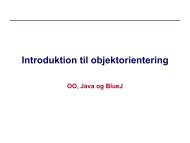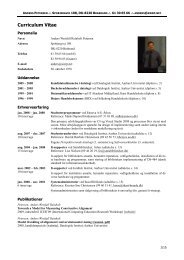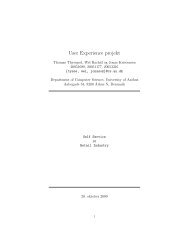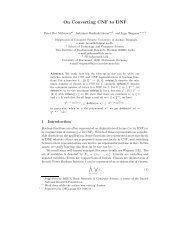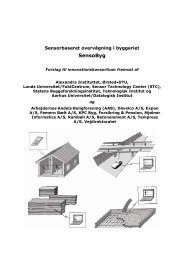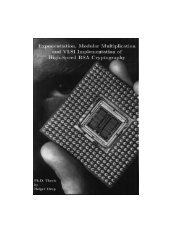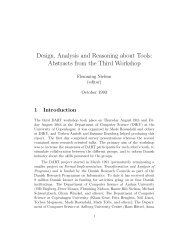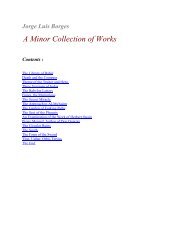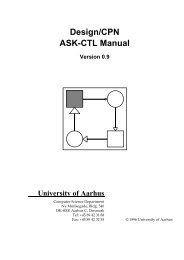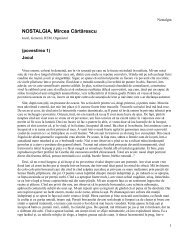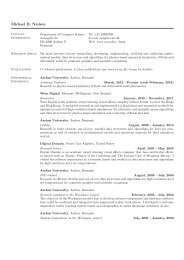towards a provotyping approach in systems development
towards a provotyping approach in systems development
towards a provotyping approach in systems development
You also want an ePaper? Increase the reach of your titles
YUMPU automatically turns print PDFs into web optimized ePapers that Google loves.
departure. It turned out, however, that the real challenge was not as much<br />
to envision a future use as to understand current practice. Until then, people<br />
thought they agreed on how the case handl<strong>in</strong>g should be and was done, but<br />
concrete experiences with the mock-up showed otherwise.<br />
If the focus <strong>in</strong> the specific <strong>in</strong>vestigation is directed more <strong>towards</strong> the<br />
current practice <strong>in</strong> general than the use of artifacts, <strong>in</strong>spiration from the<br />
organizational games can be utilized. The <strong>approach</strong> must, however, be modified<br />
to shift the focus from commitments to the future <strong>towards</strong> provocation<br />
of the present. The professional roles of the participants should not be prefered<br />
future roles, but those actually ‘played’ <strong>in</strong> current practice. Instead of<br />
focus<strong>in</strong>g on ‘solv<strong>in</strong>g’ problems through commitments and negotiations, the<br />
attention should be turned <strong>towards</strong>: what goes wrong, why, and how does it<br />
relate to other parts of the practice. In organizational games the focus is on<br />
solv<strong>in</strong>g specific problems <strong>in</strong> a given context, <strong>in</strong> provocation through concrete<br />
experience it is the context, the practice, that is questioned. Therefore, <strong>in</strong>stead<br />
of us<strong>in</strong>g situation cards present<strong>in</strong>g isolated problematic situations one<br />
should try to make longer coherent scenarios provok<strong>in</strong>g the current context<br />
from different angles. By reta<strong>in</strong><strong>in</strong>g the ord<strong>in</strong>ary roles and shift<strong>in</strong>g the focus<br />
from problem solv<strong>in</strong>g to problem elaboration or problem ‘def<strong>in</strong>ition,’ ‘play<strong>in</strong>g<br />
<strong>in</strong> reality’ can be used to provoke the given practice through concrete experience<br />
by means of situation cards rais<strong>in</strong>g problematic situations concern<strong>in</strong>g<br />
the part of current practice under <strong>in</strong>vestigation.<br />
A third <strong>approach</strong> is to visit other workplaces similar to the one <strong>in</strong> question.<br />
Similarity could mean that the other workplace visited has the same<br />
sort of problems or has found solutions that might be applicable. The ideal<br />
visit, <strong>in</strong> the context of provocation through concrete experience, <strong>in</strong>volves actually<br />
try<strong>in</strong>g out the alternative ways of do<strong>in</strong>g th<strong>in</strong>gs. In NLIS today, letters<br />
to companies order<strong>in</strong>g them to change work procedures are today written <strong>in</strong><br />
the office. An <strong>in</strong>vestigation of the possibilities <strong>in</strong> us<strong>in</strong>g portable computers<br />
<strong>in</strong>cluded a visit to tax <strong>in</strong>spectors us<strong>in</strong>g portables <strong>in</strong> their <strong>in</strong>spection. Not only<br />
did the visit provide concrete experience concern<strong>in</strong>g potential use of portables<br />
<strong>in</strong> <strong>in</strong>spection service <strong>in</strong> general, but also, it raised new questions about<br />
the quality of current work. The use of portables (and a pr<strong>in</strong>ter) to compose<br />
letters on the spot called forth issues concern<strong>in</strong>g the degree of importance of<br />
present procedures. How important is the possibility to check with colleagues<br />
and source materials, give it one more thought, ask a secretary to proof read,<br />
etc?<br />
24



